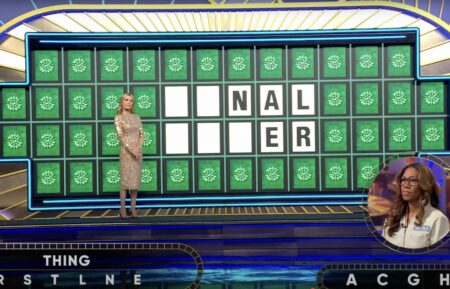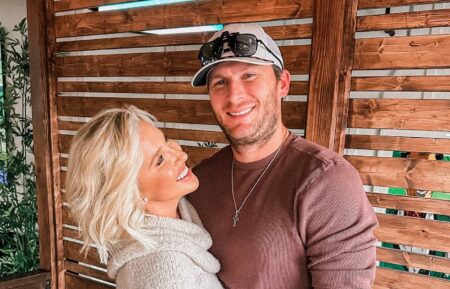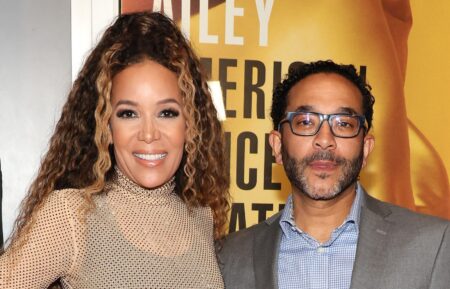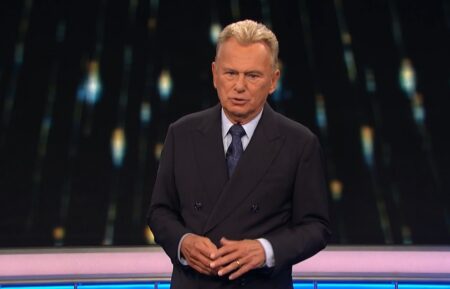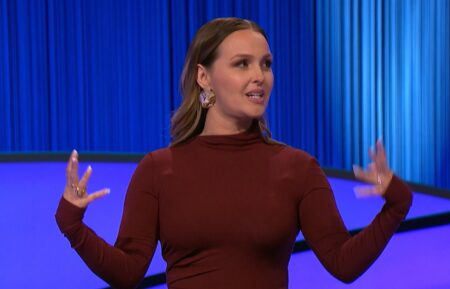Wyatt Cenac on ‘Night Train’, Leaving ‘The Daily Show’ and His ‘Feud’ With Jon Stewart
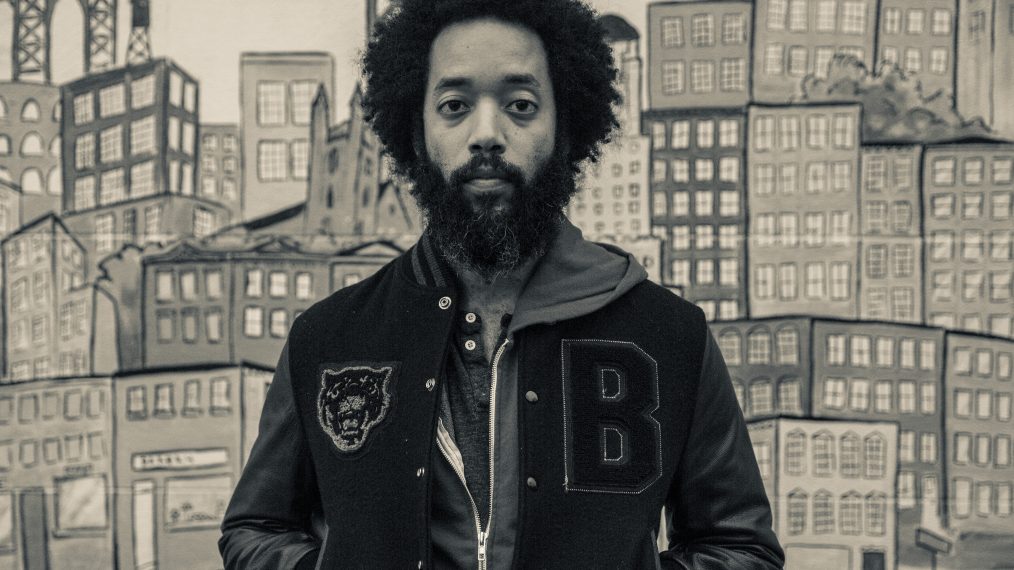
When correspondents leave The Daily Show, especially during Jon Stewart’s run, they’re usually offered their own show, a sitcom role, or are starting a movie career. Wyatt Cenac, however, left because he felt it was time to do something else. Since he departed in 2012, he’s done a stand-up special, Brooklyn, on Netflix and put out a comedy album, as well as written and produced a number of shows that didn’t get picked up to series. He also hosted a stand-up and music showcase called Night Train every Monday night at the Brooklyn club Littlefield.
On June 30, a television version of Night Train will start streaming on NBC’s service Seeso. Cenac talked to TV Insider in a wide-ranging talk about the origins of the show, what he sees on late night now, and the controversy that blew up when he talked to Marc Maron about his TDS experience and working for Stewart.
RELATED: Comedy Nerds Will Soon Have ‘Seeso,’ a New Streaming Channel
Let’s talk about Night Train. Not the show on Seeso, but just the live show in Brooklyn that this show is based on. What was the genesis of that show? How did you get it started?
The whole show got started honestly because of two comedians, Kristen Schaal and Kurt Braunohler, they host a show called Hot Tub and they were moving to Los Angeles. The show Hot Tub had been happening at Littlefield where I do the show. It was every Monday. They’ve been doing the show in New York for five or six years at that point, I think. They were both moving to LA, but the venue wanted to keep a show going and Marianne Ways, who was the producer of Hot Tub at the time wanted to keep a show going. Kristen approached me and said, “Hey, would you want to take over this show?”
I’ve done it a bunch when it was Hot Tub and always had a good time and Marianne is great, and so I said, “Yeah, sure.” It was, I think, the end of 2012 when I took it over. Yeah, it just kind of started with that. It wasn’t honestly even anything that I was thinking about doing. It just felt like the timing was right as far as my schedule was going to be a little freer because it was right when I was leaving The Daily Show, so it felt like one of those things where, “Oh, yeah. My Monday nights will be free, so it might be a fun thing to do and just a place for me to write and try out things that I’ll take on the road,” and do stuff like that. It’s been that.
Once you get into the whole routine of doing this every week for a couple of years, how tough is it to get three, four comedians and special guests and maybe some musical guests every week?
That’s one of the great things, I think, about working with Marianne is that she’s been producing shows like this for a while and has a very deep roster of people that she can reach out to. Also I think in doing the show and in doing it over the course of four years, it’s grown into something that hopefully comedians seek out and want to do. When we first started doing the show, and I think this happens whenever somebody launches a stand up show in the city. The first two weeks, it’s packed. It’s always packed and there’s always a crowd. It doesn’t matter who’s on the bill. Then you go through a little bit of a dip. People then come out depending on, “Oh, who’s going to show up? Is Janeane Garofalo going to be there? Oh, okay. Yeah, we’ll come to this week’s show,” and it’ll sell out again.
Then if it’s comedians that they aren’t as familiar with or something like that, they might say, “Eh, we’ll skip this Monday.” Probably in the first year, there were a lot of peaks and valleys where sometimes the place would be packed out and then there’d be other Mondays where the place was half full. Littlefield can hold a lot. I think at max it can hold about three hundred or something like that. If it’s not full, it feels like an airplane hangar. At some point I remember crowds consistently started coming in and they trusted the lineup that Marianne put together.
The episodes I saw had special guest spots in the middle, one with Questlove and one with Jon Benjamin. Has that always been the structure of the show, or that of evolve?
It sort of evolved, and it’s sort of something that I wanted to do initially. The first show we did as a live show, Chris Hayes actually came on the show and it was a week before election day. It’s somewhat embarrassing to say, I’d never voted until the 2012 election. I’d gone 18 years of being able to register as a voter and I’ve never registered. The 2012 election was the first time I was going to do it.
I wanted to vote in 2008, and I had pitched it as a Daily Show field segment. I wanted to do a piece about voter apathy. At the time, there were a bunch of news stories that you would see of different news anchors like Katie Couric and Harry Smith having colonoscopies and it would be like, “My personal journal with colonoscopies, and with cancer screenings,” and stuff.
I just kept seeing a bunch of those. At the time there’d been all these stories about voter apathy and I wanted to do a field piece that was my personal journey with voter apathy, but I would also wind up getting a colonoscopy. I was really hopeful that we would do it because there had just been all these stories about voter apathy and I felt like, “Oh, I could talk about it as a first time voter.” It was one of those where it never resonated higher up. We kept pitching it and it was just like, “Oh yeah, it never went.” Then by the time it died officially, it was too late for me to register, so I didn’t register in ’08. Then I didn’t have a field piece to try to pitch, so I’ll actually vote. For that show I’d ask Chris Hayes to come and talk to me as a first time voter and also tell stories when he worked registering voters and going around registering voters I think when he was in college.
We did that and then we tried to keep doing it. It’s a tougher thing to book, so now it kind of happens less frequently than it does like on the Seeso show. It was always an element that I enjoyed, and we’ll always do that, like the thing with Questlove and the sneakers. That’s in the Seeso show. I’ve actually had him come to the show a bunch and do different things; we did something once where I was an HBO pilot that Kanye West had made, and I had Questlove watch it with me on stage and comment. There’s that element that it’d be great if we could do it week after week, but now it’s just a nice little treat that we try to do every now and again when we can pull something together and think of a silly enough idea.
How do you have to adapt the show to TV?
For TV, the biggest difference is the live show we usually have six or seven comedians. The live show can run about an hour and half to, at the longest, two hours. With the TV version, they wanted us to keep everything to about an hour. We went from six to seven comedians to four. Then each episode we had a middle segment to just break up stuff.
Yeah. I think for TV, then it became a thing of okay, we need to cut down on we can’t do six to seven comedians. We’d like to keep the integrity of the comedian’s sets and still be able to let them do ten minute sets or so because it feels like if you let somebody do ten minutes, they really get the opportunity to create a connection with the audience. It felt like I’d like to be able to allow the comedians the space to breathe and the space the explore. I think in that first episode with Michelle Wolf, you see that where she winds up dropping her set for a while to interact with some audience members. I feel like if you had a five minute set, you would just burn through that. You wouldn’t even be able to do that.
RELATED: Wyatt Cenac, Ana Gasteyer to Star in Conan O’Brien’s TBS Comedy Pilot
By the way, the whole thing about the two people sitting together with the same shirt that Michelle pointed out in Episode 1, when I saw Episode 2, I saw those two people sitting in different spots, so that led me to think, “Oh, they taped them both on the same night.”
I know. When I got into the edit, we started working on that second episode and I saw that and I was so annoyed because I was like, “Wait, how did this guy get back in the front row?” because the way we shot all the episodes, we had to shoot them in three days. We shot two a day and it was for budgetary reasons. That was why we had to do that, but also I guess it says something too about the audience as far as, given the audience that came to the taping, there’s a similarity in the audience that comes to the show on a regular basis.
There are regulars and then there are people that just come for one show and maybe we see them a few months later or something like that. I think initially I was like, “Oh geez,” but then there was something kind of comforting about it later just thinking, “Oh, well there is something kind of nice about it.” This guy, good on him. He wanted to see what was essentially four hours of comedy. I don’t know if I’d sit through four hours of comedy, but good for him for doing it.
Did it take a while for the show to find a home? Your references to Black History Month and the election makes me think you taped a lot of this in 2015 or am I mistaken?
We shot everything in November of 2015 and we were working with Seeso from the beginning and I think they initially had wanted to try to have it launch by February. That was the thought was that it was going to launch, that first episode was going to launch in February. Then, I think, both on Seeso side from a programming standpoint and on our side from a cutting standpoint, everything got pushed a bit. Then it turned into well, let’s just release everything in June because they had other releases they were doing earlier in the year.
I think there are a few topical things in there and there was definitely some thought internally of how does this effect anything. To me, at the end of the day, it felt like it doesn’t. You caught a moment in time. You go back and you look at an episode of Saturday Night Live where Chevy Chase is playing Gerald Ford. I don’t think it affects your impression of, you still enjoy it even though he’s commenting on something that has already happened or even if you watch old Weekend Update or any of that type of stuff or watch an old stand up special. You can watch an old Chris Rock special, it’s still going to make you laugh and it’s still going to hold up even though he’s talking about a different president being in office. I hope that when people watch this, they see it as the whole of capturing what our show is and what the experience of going to this particular type of show is like.
When you left The Daily Show , you basically left because you wanted to do something different. It’s not like you were leaving to do a sitcom in LA or start a talk show. What did you think you wanted to do and have you been able to achieve at least some of that if not all of that since leaving?
I knew when I left, I wanted to do more things where I could have more creative control and I wanted to do things that I could make and build myself. I think, at the end of the day, I enjoy the process of building things and being able to make something. I didn’t necessarily have anything I was leaving towards, other than some sense of creative autonomy.
After I left, I wound up, I think I did some numbers once and I think I either sold or started developing maybe nine or ten different things over four years that I would either sell something or something would start to get developed. Each thing died for one reason or another, but as frustrating as it was, it was the thing of, “OK, but this is the thing I’d like to be doing: making things.” Night Train, getting to do that on Seeso, that definitely is in the realm of things that I’d like to do more of.
I think that’s also why I end up taking an active role in even just the post process of it as far as the look and the feel of it. That, to me, to be able to do more of that, I would like to do that and even doing that with directing my special Brooklyn. Doing those things I’ve gotten a great amount of joy out of. I think for me, I hope that I have now proven that I can do these things and that I can get the trust and support of some network to say, “All right, we’ll let the idiot make his thing.”
How much more stand-up do you still want to continue to do going forward? Is that still going to be a big part of what you do?
I don’t know. That’s a very good question and one that I don’t necessarily have the answer for. It’s funny. Right now doing Night Train, it’s, for me, right now all the stand up I’ve really been doing, I’ll do a spot here or there every now and again, but pretty much since I’d say the start of the year I really haven’t been going out with the same frequency that I was over the last couple years. Some of that was because I put out the Brooklyn special and then a year later put out another album. I put an album at the start of this year and that was an hour plus of all new material. Then with the Night Train thing, for each of those episodes, I needed to have at least ten minutes or so of material for each of those episodes. I think with the exception of maybe one episode, everything else was new material. In two years, I kind of put out three albums worth of material that I put out on the public record.
There’s a certain amount of exhaustion in doing that. I’d say I’m just a little tired right now where I’m like, “Okay, I need to figure out what I want to talk about on stage.” I don’t ever want to get to a point where I’m saying the same thing over and over again. I think to a certain degree when I left The Daily Show, there was a bit of that. These stories start to feel cyclical in nature and I feel like I’ve said what I want to say on this particular thing, especially with stand up albums. With my last album, I talk about police brutality and it’s one of those things where whenever there’s a new story about it I can’t just say, “Okay, listen to that thing I did four months ago,” but at the same time I don’t know if I have a new take on it. I’m like, “Yeah, that’s what I feel.”
Is that why you didn’t go the John Oliver/Samantha Bee route or were you getting offers at the time for your own show that would talk about either race or politics?
No. I’m being totally honest. I wasn’t sought after. It’s one of those … It kind of hurts to say, but I was kid at the dance that nobody really seemed that interested in dancing with. I think there’s definitely a part of me that’s thought, “Oh yeah, there’s stuff in that world that would be fun to play in.” I like late night as a medium to be creative, but if there aren’t any takers, it’s like oh yeah that’d be fun, but I’m not going to give it, I’ve given it some thought, but I can’t give it too much thought.
Do you look at their shows now and say, “I can do this”?
You know, Joel? I don’t know. I don’t necessarily think about it in that way. I think when I watch their shows, I am very proud for them and happy for them and I think they’re both doing an amazing job. I think that’s also a testament for the people that worked at that show. In truth, I think if you gave most of the writers and most of the correspondents the outlet to create something, whether it’s in topical comedy or whether it’s just their own weird thing, I feel like they’ll all succeed and surprise you in ways that you weren’t expecting. Internally, I don’t think anybody doubted that John or Sam were capable of creating great shows and I think it was one of those things where there’s only so much you can do in the role that you were given on that show.
I would hope that if I were in a position like that that I could deliver in the same way, but also I’m in the moment that I’m in. I think I don’t really think too much as far as trying not to dwell on the what ifs.
Do you watch Trevor Noah’s Daily Show?
Once I left The Daily Show, I kind of stopped watching it. Every now and again, I’ll watch if somebody I know does something. Michelle Wolf I know has been brought on as a correspondent, so I’ve watched a few of her things and when Neil Brennan was on he did something on the show and I watched his. I’ve seen some stuff that Roy Wood has done. I’ll watch a clip, but I don’t, I think … I watched it for five years straight. I think after that it’s like, “Oh yeah, this is more like work than something I’m going to sit back and enjoy.”
https://www.youtube.com/watch?v=zeBg2lwt_tY&t=1h12m33s
You did an interview with Marc Maron on his WTF podcast that went viral because of your comments about Jon Stewart. When all that started going viral a couple years ago, what were you thinking?
To me, when it all happened, I think the first thing I was thinking was, there was a certain amount of confusion as to why people were jumping on this. They seemed to believe I called Jon a racist. I think that was the weirdest thing was just I had done an interview where I was talking about my experience. I thought that in talking about it, I had spoken about my experience in as fair a way as I could because it was still coming out of my mouth, but I thought that I had been fair to both my experience and fair to Jon. I never said that I had any ill will towards the guy. I never said that I hated him. I think in the interview I said that I was grateful for my experience there and to work with him and I learned a lot from him, but I think people interpreted it how they wanted to interpret it.
I think, unfortunately, at the end of the day the biggest takeaway to me from that part of the conversation in that Maron interview was a conversation about inclusiveness and inclusiveness in the workplace and that whether you’re a black person or whether you’re a woman, whether you’re gay, whether you are the oldest person in the room or the youngest person, there is a sense of feeling like you stick out if the rest of the room looks pretty similar. How places deal with that and how they’re aware of it and what they do to work on that because it is a thing that we all love to talk about diversity, but we talk about it more as a metric than as an actual thing that has an impact on people.
A network said, “We want diversity,” then they throw a minority in a peripheral role on a TV show and they’re like, “There, we fixed it,” but it doesn’t actually address anything. There are things that happened below the line in the way shows get built up. You continue to invite just the same people to the party and there are a bunch of people on the outside who just feel excluded, but then there are also people, the ones who maybe aren’t the same people who somehow got into the party but also feel a little excluded and feel a little isolated and feel like there’s a certain sort of distance they have to travel to be understood that maybe other people don’t have to travel. If you’re the only one trying to make up that distance, if it’s not being done on both sides, it feels like a lot of work.
To me, if there was anything about that interview, it felt like people aren’t talking about just that and maybe they’re not talking about it because that then forces people to be introspective and it forces them to look at their own lives and their own workplaces. There were people who would come up to me and they said they understood, but there were a lot of people who were like, “Why did you call that guy a racist?” and it was like, “I didn’t and you either didn’t hear it or you got caught in the same weird viral media scrum of clickbait that I spent five years working with Jon making fun of.”
At the end of all of that, he and I exchanged an email when everything happened and that was part of the conversation that we had was that “Oh yeah, this thing that we spent five years mocking together is now devouring us.”
This happened to President Obama with Maron. He talks for an hour, then says the n-word out loud and that’s the story. Nobody talks about the context before or after or the whole hour interview. Just that. It’s got to be frustrating.
It is. It’s definitely a frustrating thing, but it’s also … I think you also take some solace in the fact that there are the people that are going to just hear the president say the n-word and freak the f–k out, but then there are the people who are going to listen to the substance of what he’s saying. If change is a slow, incremental process, maybe the three people who hear the substance of what the president is saying are changed and can slowly affect two or three other people and that is part of that incremental change, but those things have to exist to even inspire that change. If at the end of the day, it’s frustrating.
You can try as hard as you might and you can try and control you message, but at the end of the day, you’ve got no control over it and the best you can hope for is well, hopefully somebody hears it the way it was intended and it then moves forward in some way either with or without me that has some kind of positive effect.
Night Train with Wyatt Cenac, Premieres Friday, June 30, Seeso.


